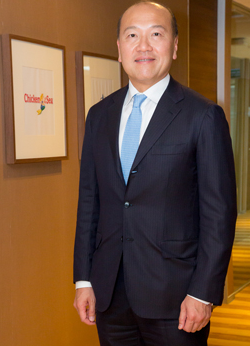Thai Union Frozen Products (TUF) reported solid operating results for the second quarter of 2015 as sales reached THB 30,642 million with improved gross profit and operating margin. In addition to positive contributions from recent acquisitions MerAlliance, King Oscar and Orion Seafood, gross and operating margins have recovered strongly despite challenging market conditions and deep depreciation of the euro from a year ago.
The Bangkok-headquartered company’s gross margin for Q2 was 16.9%, compared with 13.8% in the first quarter and 16.1% for the same period last year. During the first six months of 2015, cumulative net profit reached THB 2,919 million, up 18.1% from the first half of last year. The net profit margin of 4.9% was ahead of 4.2% realized a year ago. This figure is much in line with the company’s annual target.
 Thiraphong Chansiri, president and ceo of Thai Union Frozen Products (TUF), says that the company is on target to hit its target of US $8 billion in sales in five years.After a turbulent first quarter of 2015 due to currency rate fluctuations, the company’s operating performance is now back on track on its margin target and sales goal of US $8 billion by 2020. More importantly, its financial leverage, in terms of net debt-to-equity ratio, continued to drop to a new low level (0.68x) in recent years, indicating a strong financial position for future growth opportunities.
Thiraphong Chansiri, president and ceo of Thai Union Frozen Products (TUF), says that the company is on target to hit its target of US $8 billion in sales in five years.After a turbulent first quarter of 2015 due to currency rate fluctuations, the company’s operating performance is now back on track on its margin target and sales goal of US $8 billion by 2020. More importantly, its financial leverage, in terms of net debt-to-equity ratio, continued to drop to a new low level (0.68x) in recent years, indicating a strong financial position for future growth opportunities.
During the first half of 2015 the USA accounted for 42% of revenues, followed by Europe (31%), the domestic market (8%), Japan (6%) and other countries (13%). Tuna sales amounted to 40% of the total, followed by shrimp and related business (27%), salmon (8%), pet food (7%), sardines/mackerel (6%), and value-added and other products (12%). In general, these breakdowns have been fairly stable so far this year. However, the proportion of sales from own brands increased to 43% (vs. 41.3% a year ago) with OEM sales accounting for the balance.
“In spite of the challenges of currency fluctuations and certain one-time expenses, the operating performance of the company had been satisfactory,” said Thiraphong Chansiri, president and ceo. “Moreover, the merit of investing in first class European companies as part of our overall global strategy has been clearly demonstrated in the past few quarters by their strong operating performances. These companies show strong resilience and thrive in tough market conditions.”
Chansiri went on to say: “As we continue to move forward, we will remain focused on achieving organic growth through our core product categories and improved efficiency in our operations across the globe. Our international footprint will continue to expand and we remain committed to achieving our revenue target of US $ 5 billion this year.”
Meanwhile, it was announced on August 17 that TUF may cut its holding in US tuna brand Chicken of the Sea to facilitate the planned purchase of Bumble Bee Seafoods. The divestment is one route being considered to help ease the proposed $1.5 billion acquisition, which is subject to the approval of American authorities.
“We are considering every option. We have not made a decision about the divestment, and it should become clear within the next four to six weeks,” Chansiri stated.
The Bumble Bee deal was announced late last year as Thai Union accelerated its international expansion drive. However, the US Department of Justice recently launched an antitrust investigation of TUF’s Tri-Union Seafoods, which operates Chicken of the Sea, the third-largest tuna brand sold in the United States. The company has been subpoenaed to supply data in this regard.





